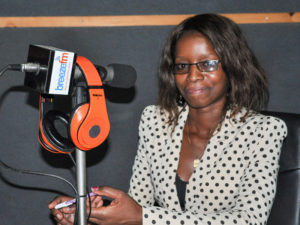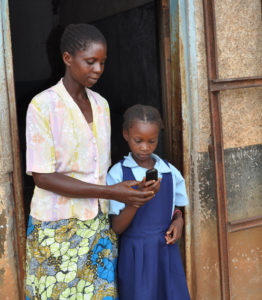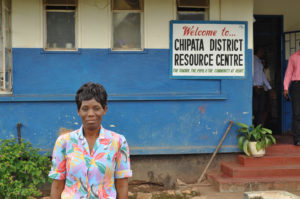[vc_row][vc_colonne][vc_column_text]
Radio & phones mobilize communities for local language literacy in Zambia
Par Jillian Slutzker
[/vc_column_text][/vc_colonne][/vc_row][vc_row][largeur vc_column = »2/3″][vc_column_text]Grille, Zambia—It is 7:15 après midi. on Saturday evening, and children and parents in rural Eastern Province, back from working in the fields and selling goods at the market, gather around their radios.
It is time for the weekly Nos valeurs radio hour on Brise FM, an independent radio station broadcasting to some 1 million listeners in the province and across borders in nearby Malawi and Mozambique.

Radio presenter Juliana Banda’s voice comes on air to share this week’s local language story, and to discuss timely education and literacy issues with special guests from the Ministry of General Education and the Makhalidwe Athu project.
Nos valeurs, meaning “The way we live” in the local language of Chinyanja, est un projet de lecture mobile using SMS messaging to bring crowdsourced, local language tales to Zambian children and families in a region where local language story books are scarce.
Outreach to the community through the radio is critical to the success of the project, which is implemented by Creative Associates International. It is funded through Tous les enfants lisent: Un grand défi pour le développement, un partenariat des États-Unis. Agence pour le développement international, Vision mondiale, et le gouvernement australien.
While the project dispatches weekly local language mobile stories and comprehension questions to the phones of more than 1,200 families associated with 40 pilot communities across the province, the radio station program sustains their engagement in between SMS messages.
“We have this message from Makhalidwe Athu which needs to go to the other end and we are bridging the gap,” says Banda.
On her Saturday show, Banda and her guests recount the story segments sent out that week. They invite listeners to phone in and ask questions or provide comments about the story itself, or to get advice on best approaches for supporting their children’s literacy development and engaging them in the stories. Listeners and callers get answers directly from the project’s community mobilizers, who are weekly mainstays on the radio show.
The station also airs up to four public service announcements each week during its regular programming. The announcements remind listeners taking part in the pilot of their role in receiving the mobile stories and engaging their children in them, and encourage other listeners not involved in the pilot to tune in to the weekly program and even submit their own short stories via SMS or through the station.
Margaret Phiri, District Resource Center Coordinator for Chipata and a regular guest on Banda’s weekly show, says the project and the radio program are drumming up excitement for literacy in the district.
“It keeps kids at home expecting stories," dit-elle, adding that many parents have contacted her asking for more and more stories.
An educational role for radio

Au cours des dernières années, Zambia has registered the lowest achievement scores among Southern Africa Development Community countries. After years of poor performance, literacy levels are now on the rise thanks to revised teaching methods and a new national local language literacy curriculum, developed by the Ministry of General Education in partnership with the U.S. Agence pour le Développement International Lire pour succéder au projet.
As a community radio station, Banda says it is incumbent upon Breeze FM to not only entertain its listeners but also to “educate and inform” them. The partnership with Makhalidwe Athu provides an opportunity to advance education in the province, elle dit.
« Sans éducation, [a person] is doomed. In today’s world you need to know what is happening around you…Being literate gives you the power to speak out. Without it then you are voiceless.”
Banda says in her own education and in her six-year radio career, during which she has supported an array of community development projects, Makhalidwe Athu stands out for its innovation in combining community mobilization, technology and education.
“In the past…we had nothing like this. We knew learning could only be provided by the teacher," dit-elle.
The project will contribute to creating a generation of children who read at home, and a cohort of parents who sit down and read with their children, elle dit. By doing so, she believes Makhalidwe Athu can have a greater impact on education and achievement in the province, beyond the pilot.
“Once we have created this environment where a mother or father sits with their child, that creates hunger in the child to go to school and learn…If we build that strong foundation through reading and comprehension, then we will build that strong society," dit-elle.
Crowdsourced tales engages the greater community

Tous 52 stories dispatched through Makhalidwe Athu in the 2016 pilot year and aired on Breeze FM are created by local writers and feature local themes. Breeze FM is playing a major role in soliciting submissions and gathering those tales from community members.
Through public service announcement, Banda tells listeners and potential authors about the requirements that stories be short, simple, culturally relevant and grade appropriate. Submissions can be made directly through the station, via a project website or through SMS to a team of project staff and Ministry of General Education officials. This team then edits the story, s'assurer qu'il est ciblé sur les compétences en lecture de deuxième année, et l'adapte au format SMS.
Local stories are more compelling and therefore more effective at engaging children than outside stories to which they cannot relate, explains Phiri, Chipata’s District Resource Center Coordinator.
“The children are coming from the communities where the stories can be formulated,» explique-t-elle.
Qui plus est, in light of the province’s shortage of reading material in local language, crowdsourcing stories from community members ensures a never-ending supply of material.
“We are rich,” says Phiri. “We can make a lot more short stories from the community.”[/vc_column_text][/vc_colonne][largeur vc_column = »1/12″][/vc_colonne][largeur vc_column = »1/4″][vc_widget_sidebar sidebar_id= »barre latérale-primaire »][list_category_posts_widget titre= »HISTOIRES CONNEXES: » cat_id= »119,255″ commande_par= »date » nombre de messages = »3″ extrait= »Oui » extrait_size= »15″][/vc_colonne][/vc_row]